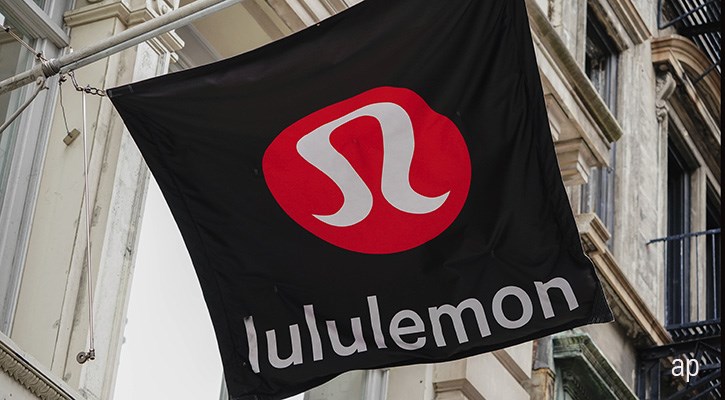
The boom in fitness has been one of the most noticeable consumer trends of recent years as wannabe athletes skip the pub and head to the gym instead.
Under lockdown though, gyms have been closed and outdoor exercise curtailed, while sporting events have been cancelled or postponed, including the Tokyo Olympics. But people stuck at home have improvised exercise routines and even bought expensive equipment – Peloton (PTON), which markets high-end bikes and exercise regimes to city dwellers, has seen a near-100% increase in subscriptions during the Covid-19 crisis.
Germany’s Adidas (ADS) and America’s Nike (NKE) are two of the most established brands in the athleisure world but the recent boom has brought in challengers like US companies Under Armour (UAA) and Lululemon (LULU) to take a piece of this lucrative market.
Strong brands are one key criteria of how Morningstar assesses whether companies have economic moats and Nike and Adidas are some of the most powerful consumer brands in the world. Shoppers now have a “tribal loyalty” towards some of these companies, says James Thomson, manager of the Silver-rated Rathbone Global Opportunities fund, which invests in Lululemon.
Here we look at five of the key companies in this sector, which may be giving us a glimpse in to the future of stay-at-home fitness if people continue to shun gyms post-lockdown.
Nike
Wide Moat
4 Stars
Nike is ranked number 16 in Interbrand’s list of global brands and that’s one of the reasons Morningstar analysts assign it a wide economic moat rating. But Nike is currently trading below its fair value of $98 and is rated as a four-star stock.
“We view Nike as the leader of the athletic apparel market and believe it will overcome the extraordinary challenge of COVID-19… [it] will maintain premium pricing and generate economic profits for at least 20 years,” says analyst David Swartz.
Nike is held by a wide range of active funds, including Merian North American Equity fund, which has a Morningstar Analyst Rating of Silver.
Adidas
Narrow Moat
3 Stars
The German firm has a narrow rather than wide economic moat and, rated three stars, is considered fairly valued. As a sponsor of a number of high-profile athletes, Adidas is in a strong position to benefit from China’s huge investment in sport, particularly in football, says Morningstar’s Swartz.
It's not all plain-sailing however, he is modelling a 44% year-on-year drop in sales for Adidas in the second quarter of this year as the coronavirus crisis really starts to bite.
The stock is a holding in many European growth funds, including Silver-rated European Opportunities Trust (JEO), the trust run by former Jupiter star manager Alexander Darwall; the fund he used to manage, Bronze-rated Jupiter European, allocates 5.5% towards the German company.
Lululemon
Narrow Moat
1 star
Rathbones’ Thomson holds Lululemon, which floated in 2007, as it’s an example of “a company that’s growing market share in a growing market”. The Canadian business started off selling yoga clothing for women but has expanded to offer exercise classes (now online) and accessories.
Morningstar assigns Lululemon a narrow moat because of its strong brand. Analyst David Swartz says the firm “will continue to achieve premium pricing due to the brand’s popularity and the styling and quality of its products".
The catch is that the stock market fully appreciates Lululemon’s potential and is rated by Morningstar analysts as a one-star stock: they think its fair value is $142 rather than the current toppy level of $234.
Under Armour
No Moat
4 stars
Under Armour is a relatively new entrant to the sportswear world and is trying to take on the might of Nike and Adidas. The firm has spent significant sums on both marketing and sponsorship.
But shares have fallen from $21.78 in January to $7.55, a drop of 65%, a trend heightened by a recent poor trading update. “Under Armour’s results for the first quarter of 2020 were even worse than we had feared, and it appears there is little hope of a quick recovery,” says Morningstar’s Swartz.
While shares are trading below their fair value of $12.40, they could be a riskier proposition than other companies in the sector.
Peloton
(Not Covered)
The pricey bikes company is a wildcard in our list because it’s not yet under Morningstar coverage and has only recently floated. Still, unlike other high-profile floats like Uber (UBER), Peloton is trading above its IPO price – the company floated at a share price of $29 and is now at $45, a gain of more than 55%. With gym bunnies unable to get to their usual spin classes, the lockdown has helped boost the appeal of its products, but will this continue?
For those who think Peloton shares are too expensive, Craig Bonthron and Neil Goddin, co-managers of the five-star rated Kames Global Sustainable Equity Fund, rate Italy’s Technogym (TYGM), which sells treadmills, static bikes and other gym accessories. Bonthron thinks Technogym is “well-run with high returns on invested capital, an enduring brand and attractive opportunities to continue to grow in markets including the US and China".
Will We Go Back to the Gym?
Sportswear is still part of the retail sector, which is under extreme pressure during lockdown with many stores stull closed. Still, as people get used to exercising at home, demand for online leisure products will remain strong, Thomson argues. And as lockdown restrictions are lifted, that should act like a “coiled spring of growth” for these companies’ products.
Benjamin Moore, European equities portfolio manager at Columbia Threadneedle, argues that these businesses should continue to benefit from long-term trends: "Our faith in the long-term attractiveness of the sportswear sector is undimmed: arguably it is more important than ever to stay fit and healthy."
While Morningstar’s Swartz thinks there is potential for a rebound when sports retailers re-open, it’s a long road to recovery for even the strongest firms.





























